I Am American In Japanese
Did you lot mean: ?
I Am American in Chinese / Japanese...
Purchase an I Am American calligraphy wall scroll hither!
Personalize your custom "I Am American" project by clicking the button next to your favorite "I Am American" title below...
American
Person from the USA
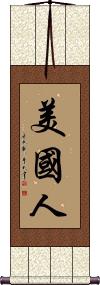
美國人 means "American" or literally "American Person" in Chinese.
American Soldier / American Serviceman

美國軍人 means "American Soldier" or literally "American War machine Person".
This tin can also be translated equally, "American armed forces personnel", or "American serviceman". Gender is non specified in this title, then it's appropriate for male or female soldiers.
American Kenpo
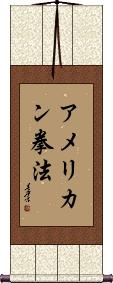
アメリカン拳法 is the well-nigh common name American Kenpo or American Kempo in Japanese.
You may also meet this every bit アメリカ拳法 (dropping the "ン" or "N" sound from American) or 米国拳法 (uses the older Japanese name for America as "Rice Country" along with Kenpō).
Note: Because this selection contains some special Japanese Katakana characters, it should be written by a Japanese calligrapher.

美式橄欖球 is the Chinese title for "American football" (non to be confused with international football known as soccer in the USA).
If you are a role player or fan of American football, this would make a great wall gyre for your domicile.
The starting time two characters mean "American style".
The last three characters mean football game or rugby (a game involving an oblong or ovoid ball).
The "American" describing word is needed in this championship to differentiate from Canadian football, Australian rules football, and rugby.
See Also: Soccer
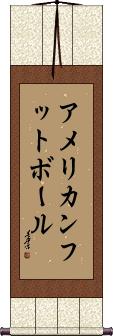
アメリカンフットボール is the total/long title for "American football" in Japanese Katakana.
It is "Amerikan Futtoboru" which is supposed to sound similar "American Football".
Note: Because this championship is entirely Japanese Katakana, information technology should exist written by a Japanese calligrapher.
See Likewise: Soccer
American Samoa

美屬薩摩亞 is the Chinese name for the territory of American Samoa (formerly known as Eastern Samoa).
This should not be dislocated with Independent Somoa which is to the west.
If you lot want just a general "Samoa" title, merely employ the apparently "Samoa" entry, equally it does not really designate western, eastern, American, or independent.
Meet Also: Oceania

アメフト is a short word that means "American football" in Japanese.
Information technology is supposed to audio like an abbreviated version, "ame futo" which sounds like "ah-may human foot-oh" (American Football).
There's non a slap-up standard way to say "football" in Japanese, equally the sport is not popular in Japan. Other Japanese terms for football can be confused with soccer or rugby.
Notation: Because this championship is entirely Japanese Katakana, it should exist written by a Japanese calligrapher.
See Also: Soccer
Native American / Indian
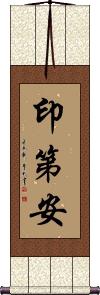
印第安 is the Chinese title for (American) Indian or Native American.
For disambiguation, this refers just to indigenous people North America.
印第安 is a transliteration, so information technology is meant to audio like the English language word "Indian" using Chinese sounds.
印第安 is non a common selection for a calligraphy wall coil.
North American Opossum / Possum

北美負鼠 is the full title for North American Opossum (aphesis spelling: Possum). The offset two characters mean "North American" equally an adjective. The third graphic symbol ways "carries" and refers to the marsupial pouch. The final graphic symbol means "rat". You could say the literal translation is "marsupial rat".
Chinese opossums vary from the North American diverseness. If you were to apply the last two characters lone, it may propose the species native to Cathay.
See Also: Year of the Rat
Flying Tigers AVG

飛虎隊 is the total Chinese title of the "Flying Tigers Group".
These were the American pilots that volunteered to go to China and fight the Japanese prior to the entry of the USA into World War Two. These fighter pilots were so esteemed in China, that fallen American pilots could always notice refuge in villages, and rubber passage and escape to areas of Cathay that were not occupied by Nihon at that time. Chinese villagers helped such fallen pilots with full knowledge that when the Japanese occupation forces found out, all the men, women, and children in the village would exist massacred by Japanese troops (at that place are more than a few known cases of such massacres).
The Flying Tigers successfully kept supply lines to the Chinese resistance open up, and divided Japanese forces at a crucial time while America prepared to officially join WWII.
A wall curlicue like this honors the men who risked or gave their lives as noble volunteers, and is a reminder of the best moment in the history of Sino-American relations.
These three characters literally mean "flying tiger(s) group/team/squad".
Annotation: Hanging these characters on your wall will not make you any friends with Japanese people who are enlightened or this history (well-nigh Japanese accept no thought, as Nippon's involvement in WWII has all merely been erased from school textbooks in Japan).
United States Marine Corps

米海兵隊 is the Japanese style to write "United states Marine Corps" or simply "U.S. Marines".
Breaking down each Kanji, this ways:
"rice (American) ocean/sea soldiers/army/military corps/regiment/group".
This title will just make sense in Japanese, it is not the aforementioned in Chinese! Make sure yous know your audience before ordering a custom wall roll.
If you are wondering about the rice, America is known as "rice country" or "rice kingdom" when literally translated. The Kanji for rice is frequently used every bit an abbreviation in front end of words (like a sub-adjective) to make something "American". Americans say "rice-burner" for a Japanese automobile, and "rice-rocket" for a Japanese motorcycle. If you did the same in Japanese, information technology would exist exactly the opposite pregnant.
Annotation: I have not verified this but I've found this title used for U.S. Marines in Korean articles, so information technology'southward near likely a normal Korean term every bit well (but but in Korean Hanja).
See Also: Marine Corps | Navy | Army | Art of War | Warrior | Military
Madonna

マドンナ is the name Madonna in Japanese.
マドンナ is also used to refer to the American singing star, Madonna.
Note: Because this title is entirely Japanese Katakana, information technology should be written by a Japanese calligrapher.
Madonna

馬東納 is a mutual transliteration to Mandarin Chinese for the name Madonna.
馬東納 is used for the place name, Madonna, Maryland, but not for the American vocalist/star.
Senpai / The Elder or Master
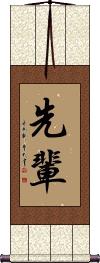
先輩 is a Chinese, Japanese, and onetime Korean discussion or title that ways elders, senior (at work or school), superior, older graduate, progenitor, or old-timer.
In American dojos, this is sometimes romanized as Sempai.
Middle for an eye

This same proverb seems to exist used in virtually every language and culture around the world.
Whether you are Arab, Persian, Jewish, European, British, Asian, or American, this proverb is well known equally the "original course of justice".
Samoa

薩摩亞 is the Chinese name for the country of Samoa (formerly known as Western Samoa).
The official name is the Independent State of Samoa. Not to be confused with American Somoa which is to the southeast.
Come across Also: Oceania
Guevara
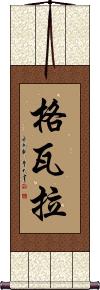
格瓦拉 is the Spanish family name, Guevara.
Probably the most famous person to take this family proper noun is Ernesto "Che" Guevara, the Cuban / Latin American revolutionary.
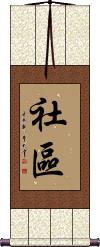
社區 is how to write community in Chinese.
社區 tin mean the neighborhood you lot live in. It can as well exist used in the aforementioned way we utilize the word customs in English.
Examples: African-American community, Christian customs, Asian community etc.
If you need a special calligraphy wall scroll to describe your community, only contact me, and I'll interpret it and go far for you.
Easter

復活節 is the Chinese and old Korean way to write Easter.
Easter is not a well-known holiday in Red china, but Chinese Christians practice tend to follow the American tradition of the Easter egg ritual etc. Non-Christians may recall information technology'due south a celebration of rabbits that can lay eggs.
South korea has a college pct of Christians than any other Asian land, then they celebrate Easter with enough of enthusiasm.
Opossum / Possum
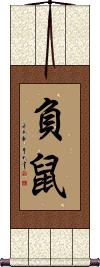
負鼠 is the name for Opossum (aphesis spelling: Possum) in Chinese.
The starting time character means "carries" and refers to the marsupial pouch. The second grapheme means "rat". You could say the literal translation is "marsupial rat".
Chinese opossums vary from the North American variety. Using the two characters shown here may propose the species native to China.
See Besides: Year of the Rat
Trust in God / In God We Trust

相信上帝 ways exactly what the title suggests. The first two characters hateful "trust" or "believe" and the second 2 mean "God" (as in the God of Abraham and the God of Zion).
相信上帝 is too how the American phrase "In God We Trust" every bit seen on U.S. Currency would be translated into Chinese. It would also be correct to say that this means "Believe in God", though in this arrangement/context, 1 would be more likely to translate information technology as "trust".
Mi Guk Kwan
American Schoolhouse
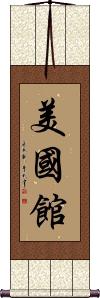
美國館 is a Korean Hanja championship, which roughly means, "U.Southward. Schoolhouse".
The offset two characters mean "U.s." (literally: Beautiful Kingdom/Country).
The last graphic symbol means, "schoolhouse", "building", "schoolroom" in this context.
This "Mi Guk Kwan" championship is used to mean, "The American School of Tang Soo Do".
If y'all want this in modern Korean Hangul, just click the Hangul in the pronunciation box next to the Korean flag above.
Read 10,000 Books, Travel 10,000 Miles
dú wàn juǎn shū, xíng wàn lǐ lù
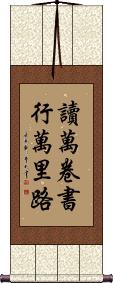
讀萬卷書行萬里路 is a lifelong suggestion for expanding your horizons by gaining knowledge, feel, and seeing the world.
Of grade, this was written long agone when it was hard to travel x,000 miles (at to the lowest degree 1000 years earlier the invention of the airplane).
With air travel and the business I'm in, I often achieve that lifetime goal on a monthly ground.
However, I am a piffling backside in the volume count.
Note: An ancient Chinese mile (里 or lǐ) referred to in this proverb is about a third of a British/American mile. However, at that time, this was a nifty altitude to travel.
Sasuke
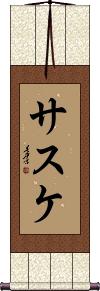
サスケ is the Japanese title of the TV evidence, Sasuke Ascension.
サスケ is the original Japanese Tv testify that inspired the American Ninja Warrior, Ninja Warrior Britain, and other variations.
It should exist noted that in Japan, the shows title is normally displayed in uppercase Roman letters every bit "SASUKE", rather than the Japanese text, サスケ. Although, both titles are known in Japan (yous'd probably demand to search for サスケ if looking to buy a Sasuke DVD in Japan).
Notes: Sasuke can also be a given name (written the aforementioned way). There are likewise other names that romanize as Sasuke in Japanese.
Note: Considering this title is entirely Japanese Katakana, it should exist written by a Japanese calligrapher.
Leopard / Panther / Jaguar
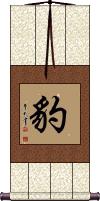
豹 is the Chinese and Japanese discussion for the big cat known as a leopard, panther or Jaguar.
This tin can refer to well-nigh cats of the Panthera genus as well as the Puma genus (but this is non used for nearly kinds of lions, except smaller ones similar the mount lion).
Because Jaguars are not native to Asia, the characters for "American continent" is normally added before this character to specifically designate a Jaguar.
This also kind of ways Panther or Leopard in Korean Hanja but in mod Korean, they add together a Hangul character to consummate the give-and-take.
Brevity: Fewer Words are All-time

Get to the point quickly with the fewest words possible is the proffer of this Chinese proverb.
Merely taking it deeper, there is a warning that using also many words may human action to "tip your hat" or "evidence your hand" (to use two American idioms).
It can also exist said that using many words does not make the bulletin have more value.
少說為佳 is really nigh the art of brevity.
At present my merely hope is that I did non use too many words to explain this maxim.
Asian Pride / Oriental Pride / AZN Pryde
dōng fāng zì zūn
dung fong chi juen
tou hou zi son

東方自尊 is the nearly universal way to write "Asian Pride".
We worked on this one for a long time. The effort involved both Chinese and Japanese translators and lengthy discussions. If yous accept been searching for this term, there is a reason that it's difficult to find the way to write "Asian Pride" in Chinese and Japanese - it's because of the inherent difficulties in figuring out a universal combination of characters that tin can be read in all languages that use forms of Chinese characters.
This final solution that yous see to the left creates a reasonable title in Chinese, and an exotic (peradventure unusual) title in Japanese (This could be read every bit "Eastern Self-Respect" in Japanese").
Although non as natural, it does accept the same meaning in Korean Hanja and the older-generation of Vietnamese people volition be able to read it too.
The first two characters literally hateful "Oriental" and the second two mean "pride", "self-esteem", or "self-respect" (we chose the near non-arrogant way to say "pride"). If you lot have "Asian Pride" (sometimes spelled Asian Pryde) these are the characters for you.
Note: For those of you that wonder, at that place is nothing technically wrong with the word "Oriental". It is a correct word, and any bad meanings were created by then-chosen "Asian Americans" and Caucasians in the United States. To say "Asian" would non completely correct to the intended significant, since that would include people from Kingdom of saudi arabia, Iraq, Iran, India, and portions of Russia.
For further proof, if y'all were of Eastward Asian beginnings and born in England, you would be known as a "British Oriental" (The "Oriental stigma" is basically an American creation and, therefore, applies mostly to the American English linguistic communication - where they get a bit overzealous with political definiteness).
Further, since the Chinese and Japanese word for Oriental is not English, it tin can not be construed having ill-significant. One trip to Mainland china or Nihon, and y'all will observe many things titled with these 2 characters such as malls, buildings, and business names. These places also employ "Oriental" every bit their English language title (much every bit we exercise, since our Chinese business organization name starts with these same ii characters).
In curt, the first 2 character have the meaning that Americans adhere to "Asian" but is more than technically correct.
Beauty / Cute / Handsome
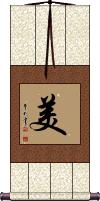
美 is frequently used to describe the beauty of a woman.
Notwithstanding, when applied to a man, it can hateful handsome. It'due south as well the beginning character in the discussion for "beauty salon" which you volition see all over China and Japan.
This tin be used as the given proper noun for a girl (spell information technology or say information technology as "Mei" or "May").
For a bit of trivia: The championship for the "USA" in Chinese is "Mei Guo" which literally means "Beautiful Country". This name was bestowed at a fourth dimension before Chairman Mao came to power and decided that China didn't like the United states of america anymore (even though nosotros fought together confronting the Japanese in WWII). But these days, Chinese people love Americans (but have distaste for American politics and policy). But I digress...
美 is likewise how "Beautiful" is written in Japanese Kanji and Korean Hanja. 美 tin too hateful: very satisfactory; skillful; to exist pleased with oneself; abbreviation for the USA; fine; handsome; admirable; madhura; sweet; pleasant.
Encounter Also: Beautiful Woman | Beautiful Girl
Ninja
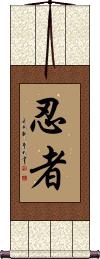
In feudal Japan, ninja or shinobi (literally, "ane who is concealed" or "one that endures") were sometimes assassins and agents of espionage. The ninja, similar samurai, followed their own special code of conduct.
The role of the ninja has been romanticized in many American movies (and to a bottom extent in Japanese movies). Because the ninja-craze has taken off in the west, Japan has followed the trend and y'all'll see plenty of ninja-related imagery in Japan.
![]() Note that when writing this as Kanji, Japanese will tend to write the first character in the form shown to the right. If yous select our Japanese main calligrapher, please wait that course. Our Chinese calligraphers can also write it in the Japanese form but only if y'all request information technology (in the special instructions almost your order during checkout).
Note that when writing this as Kanji, Japanese will tend to write the first character in the form shown to the right. If yous select our Japanese main calligrapher, please wait that course. Our Chinese calligraphers can also write it in the Japanese form but only if y'all request information technology (in the special instructions almost your order during checkout).
See As well: Samurai | Warrior | Ninjitsu
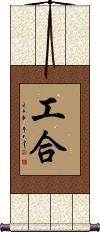
工合 is one of those Asian words that is used more in English than it is in the original Chinese.
Gung Ho was originally used to speak of Carlson'south Raiders, a grouping of "Gung Ho" U.S. Marines who went on an island-hopping campaign of death during WWII.
A movie called Gung Ho came out in the mid-1940s and was later re-released in the 1950s depicting the 2nd Marine Raider Battalion, and brought this discussion to the mainstream.
It is even so sometimes used today inside the U.Due south. Marine Corps brotherhood to refer to a unit of measurement or group that works well together, or is otherwise efficient and motivated (has skilful moral).
In 1986, there was a movie called Gung Ho, about a Japanese visitor taking over an American automotive factory. They completely ignored the fact that this was a Chinese title.
It should exist noted that this title actually means a condition, state, way, or health of something in Japanese.
Linguistic communication and pronunciation notes:
Like many Asian words absorbed into common use in English language, this one is drastically mispronounced. The official Romanization is "gong he" but that doesn't tell you enough. The vowel sound on the first grapheme is like the English word "own", now just add the g-sounds to the beginning and end. The second character is misleading, equally you might think it is like the English language word "he". In reality, the vowel sound is more than similar the "u" in "upwards".
Information technology should as well be noted, that the current generation in Cathay no longer uses, or recognizes this as a common word or slogan.
Annotation: This tin be pronounced and is a word in Japanese, though seldom used. Japanese will use a variation of "具合" instead. But still, non mutual.
Che Guevara
Latin American / Cuban Revolutionary

切格瓦拉 is the proper name "Che Guevara", as written (transliterated) in Mandarin Chinese.
 In one case revered by Chinese people as a Socialist rebel, he'south now just a historical figure that school children briefly learn about in People's republic of china.
In one case revered by Chinese people as a Socialist rebel, he'south now just a historical figure that school children briefly learn about in People's republic of china.
切格瓦拉 is because Cathay used to be a truly-Communist/Socialist nation, and thus, other Communists and Socialists were heroes.
In mod Communist china, with its free-market economic system, those sometime heroes fade a little.
Nosotros are not offering the "Che" character alone, equally few would associate information technology with Che Guevara, so you really need the full name to be clear (minus Ernesto, which is his real first proper name).
The following table may be helpful for those studying Chinese or Japanese...
| Title | Characters | Romaji (Romanized Japanese) | Various forms of Romanized Chinese | |
| American | 美國人 美国人 | méi guó rén mei2 guo2 ren2 mei guo ren meiguoren | mei kuo jen meikuojen | |
| American Soldier American Serviceman | 美國軍人 美国军人 | méi guó jūn rén mei2 guo2 jun1 ren2 mei guo jun ren meiguojunren | mei kuo chün jen meikuochünjen | |
| American Kenpo | アメリカン拳法 | amerikan kenpou amerikankenpou amerikan kenpo | ||
| American Football game | 美式橄欖球 美式橄榄球 | měi shì gǎn lǎn qiú mei3 shi4 gan3 lan3 qiu2 mei shi gan lan qiu meishiganlanqiu | mei shih kan lan ch`iu meishihkanlanchiu mei shih kan lan chiu | |
| American Football | アメリカンフットボール | a me ri kan fu tto bo ru amerikanfuttoboru | ||
| American Samoa | 美屬薩摩亞 美属萨摩亚 | měi shǔ sà mó yà mei3 shu3 sa4 mo2 ya4 mei shu sa mo ya meishusamoya | ||
| American Football | アメフト | ame futou / amefutou / ame futo | ||
| Native American Indian | 印第安 | yìn dì ān yin4 di4 an1 yin di an yindian | yin ti an yintian | |
| North American Opossum Possum | 北美負鼠 北美负鼠 | běi měi fù shǔ bei3 mei3 fu4 shu3 bei mei fu shu beimeifushu | pei mei fu shu peimeifushu | |
| Flight Tigers AVG | 飛虎隊 飞虎队 | fēi hǔ duì fei1 hu3 dui4 fei hu dui feihudui | fei hu tui feihutui | |
| United States Marine Corps | 米海兵隊 | bei kai hei tai beikaiheitai | ||
| Madonna | マドンナ | madonna | ||
| Madonna | 馬東納 马东纳 | mǎ dōng nà ma3 dong1 na4 ma dong na madongna | ma tung na matungna | |
| Senpai The Elderberry or Master | 先輩 先辈 | sen pai / senpai | xiān bèi / xian1 bei4 / xian bei / xianbei | hsien pei / hsienpei |
| Eye for an middle | 以眼還眼 以眼还眼 | yǐ yǎn huán yǎn yi3 yan3 huan2 yan3 yi yan huan yan yiyanhuanyan | i yen huan yen iyenhuanyen | |
| Samoa | 薩摩亞 萨摩亚 | sà mó yà sa4 mo2 ya4 sa mo ya samoya | ||
| Guevara | 格瓦拉 | gé wǎ lā ge2 wa3 la1 ge wa la gewala | ko wa la kowala | |
| Community | 社區 社区 | shè qū / she4 qu1 / she qu / shequ | she ch`ü / shechü / she chü | |
| Easter | 復活節 复活节 | fù huó jié fu4 huo2 jie2 fu huo jie fuhuojie | fu huo chieh fuhuochieh | |
| Opossum Possum | 負鼠 负鼠 | fù shǔ / fu4 shu3 / fu shu / fushu | ||
| Trust in God In God We Trust | 相信上帝 | xiāng xìn shàng dì xiang1 xin4 shang4 di4 xiang xin shang di xiangxinshangdi | hsiang hsin shang ti hsianghsinshangti | |
| Mi Guk Kwan | 美國館 美国馆 | měi guó guǎn mei3 guo2 guan3 mei guo guan meiguoguan | mei kuo kuan meikuokuan | |
| Read ten,000 Books, Travel 10,000 Miles | 讀萬卷書行萬里路 读万卷书行万里路 | dú wàn juǎn shū, xíng wàn lǐ lù du2 wan4 juan3 shu1 xing2 wan4 li3 lu4 du wan juan shu xing wan li lu duwanjuanshuxingwanlilu | tu wan chüan shu hsing wan li lu | |
| Sasuke | サスケ | sasuke | ||
| Leopard Panther Jaguar | 豹 | hyou / hyo | bào / bao4 / bao | pao |
| Brevity: Fewer Words are Best | 少說為佳 少说为佳 | shǎo shuō wéi jiā shao3 shuo1 wei2 jia1 shao shuo wei jia shaoshuoweijia | shao shuo wei chia shaoshuoweichia | |
| Asian Pride Oriental Pride AZN Pryde | 東方自尊 东方自尊 | tou hou zi son touhouzison to ho zi son | dōng fāng zì zūn dong1 fang1 zi4 zun1 dong fang zi zun dongfangzizun | tung fang tzu tsun tungfangtzutsun |
| Beauty Beautiful Handsome | 美 | bi | měi / mei3 / mei | |
| Ninja | 忍者 | ninja | rěn zhě / ren3 zhe3 / ren zhe / renzhe | jen che / jenche |
| Gung Ho | 工合 | guai | gōng hé / gong1 he2 / gong he / gonghe | kung ho / kungho |
| Che Guevara | 切格瓦拉 | qiè gé wǎ lā qie4 ge2 wa3 la1 qie ge wa la qiegewala | ch`ieh ko wa la chiehkowala chieh ko wa la | |
| In some entries above you will see that characters have different versions above and beneath a line. In these cases, the characters above the line are Traditional Chinese, while the ones below are Simplified Chinese. | ||||
Many custom options...
![]()
![]()
![]()
![]()
And formats...
![]()

![]()
Successful Chinese Grapheme and Japanese Kanji calligraphy searches within the last few hours...
All of our calligraphy wall scrolls are handmade.
When the calligrapher finishes creating your artwork, information technology is taken to my art mounting workshop in Beijing where a wall curlicue is fabricated by paw from a combination of silk, rice paper, and woods.
Later on we create your wall coil, it takes at to the lowest degree two weeks for air mail commitment from Beijing to you.
Let a few weeks for delivery. Rush service speeds it upwardly past a week or two for $10!
When y'all select your calligraphy, yous'll be taken to another page where you lot can choose diverse custom options.
Check out my lists of Japanese Kanji Calligraphy Wall Scrolls and Old Korean Hanja Calligraphy Wall Scrolls.
Some people may refer to this entry as I Am American Kanji, I Am American Characters, I Am American in Standard mandarin Chinese, I Am American Characters, I Am American in Chinese Writing, I Am American in Japanese Writing, I Am American in Asian Writing, I Am American Ideograms, Chinese I Am American symbols, I Am American Hieroglyphics, I Am American Glyphs, I Am American in Chinese Letters, I Am American Hanzi, I Am American in Japanese Kanji, I Am American Pictograms, I Am American in the Chinese Written-Language, or I Am American in the Japanese Written-Linguistic communication.
13 people have searched for I Am American in Chinese or Japanese in the by year.
I Am American was concluding searched for by someone else on Apr 20th, 2022
I Am American In Japanese,
Source: https://www.orientaloutpost.com/shufa.php?q=i+am+american
Posted by: propsttwithe88.blogspot.com


0 Response to "I Am American In Japanese"
Post a Comment